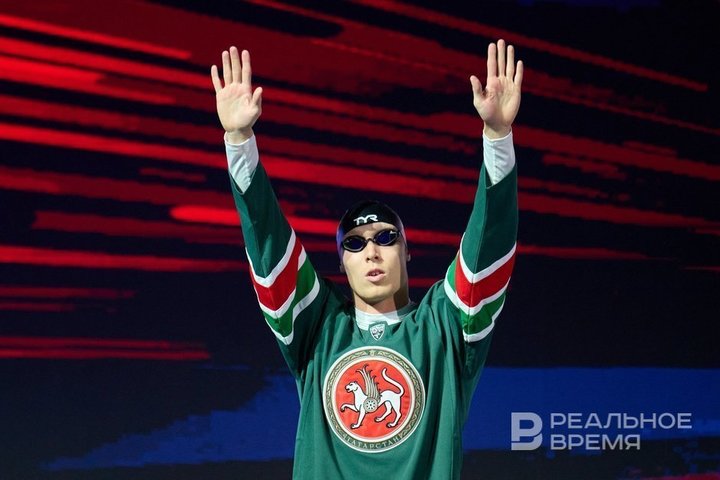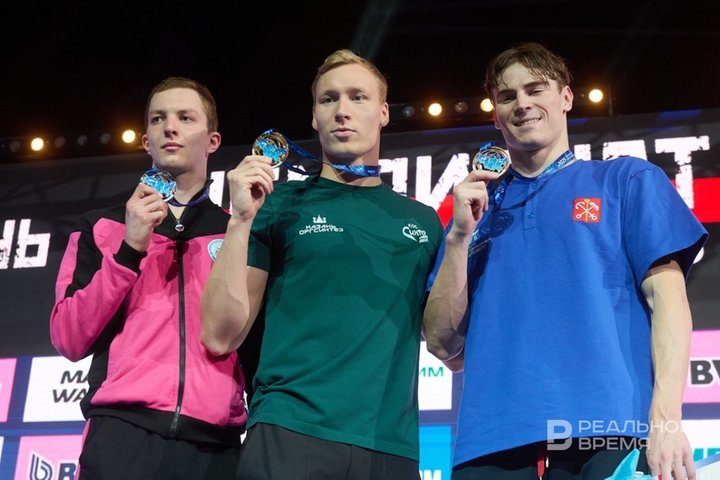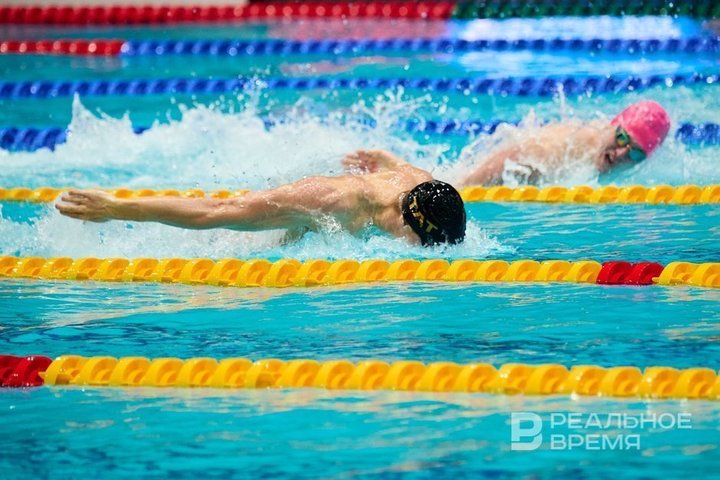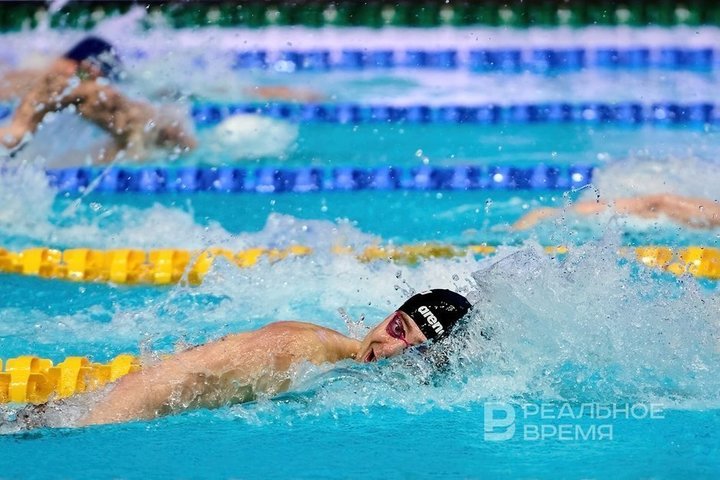Swimming in Tatarstan is two titans: Diakova and Minakov
Two representatives of Tatarstan will compete in the World Championships

The Russian Swimming Championships completed the trilogy of national championships in Kazan at the beginning of 2025. Cross-country skiing, table tennis and swimming increased the level of importance of the tournaments. Realnoe Vremya analyzes the last of the three competitions and all of them together.
Minakov's Russian record, Diakova’s junior record
The longest of the three competitions was the Russian Cross-Country Skiing Championships, which began on 1 March in Kazan and ended only on 13 April with 70-kilometre races in Monchegorsk. Between them, there was table tennis — the national championship, which had a continuation in the form of an international tournament in Bogatye Saby and the opening of five sports complexes in the districts of Tatarstan. Finally, the Russian swimming championship will continue throughout the summer season, since swimmers were selected for the world and junior championships, as well as the Universiade in Kazan.
The sports results of the Kazan championship are such that the two leaders of the republican team — Andrey Minakov from the Sintez sports club and Sofia Diakova — won the lion's share of the awards, leaving their partners with mere trifles. Diakova won the 400 and 800 metre freestyle, both times fulfilling the standard required to participate in the world championship in Singapore. Plus, she set a junior record for Russia in the 800 metre. Andrey Minakov became the champion in the 100 metre butterfly, also with a new record, only among adults. Plus was second in the 100m freestyle.
In the 50 metre breaststroke (Ralina Gilyazova) and 200 meters butterfly (Anastasia Kolpakova) they won bronze medals. The athletes did not meet the standard of the world championship, but we hope that they will get a chance to start at the World Summer Universiade in Germany, where the Russians, most likely, were also selected, as well as for all the juniors championships that will be held this year. Therefore, the results of Eduard Valiakhmetov in medley, Anastasia Chernyshova getting into the finals (born in 2010) and Karina Akinova (born in 2007) will also be kept in mind as a potential application for international starts.
We will note Almetyevsk resident Alexey Merzlyakov, who a month before the current start participated in the veteran championship of Russia. True, the 50-year-old swimmer took part there in an unclear capacity, since one of his results was declared as a new Russian record in the Masters category, and he is not listed among the winners. But now Merzlyakov is in the top six in the 50m freestyle behind Kornev, Kolesnikov, Samusenko, and Grinev.

Everything flows, everything changes
Yulia Yefimova won silver in the 50 and 100 metre breaststroke, failing to meet the standard required to qualify for the World Championship. At the time of writing, it was unknown whether the veteran of world swimming would be included in the national team by decision of the coaching council, headed by new coach Andrey Shishin. There are reasons for this: for example, the number of delegation members, maximum use of the athlete in the same relays, medley, mixed. Even such a nuance — who to give the start in the mixed relay, a male backstroker, to create a reserve, or a girl, thereby reducing the chances of the breaststroker Yefimova to start.
Breaststroke, at least in Russia, has become a swimming discipline that is as democratic as possible in terms of the age of the participants. Next to Yefimova was Vitalina Simonova (both were born in 1992), among the men, their peers were the finalists Andrey Nikolayev and Kirill Strelnikov. By the way, Nikolayev's national record in the 50-metre distance was taken away in Kazan, and even at the stage of the semi-final swims. At the same time, the long careers of Yefimova and Simonova began back in 2006, when they started at the adult Russian championship (the age limit for entry was 14 years, in Kazan it was limited to 2011). There is nothing surprising in this, once Soviet swimming blew up the world with its schoolgirls — Yulia Bogdanova (14 years old), Svetlana Varganova and Lina Kachyushite (15 years old). But then the topic was closed, since the girls left the sport, having barely crossed the student age. And now the careers of Yefimova and Simonova count 20 years, about the same as the current leader of the national team in breaststroke Yevgenia Chikunova. By the way, she also successfully debuted at 14, and we wish her a long life in sports.
On the first day of the Kazan competition, Mikhail Dovgaluk won gold in the 200-metre race, Ivan Giryov won silver, and Mikhail Vekovishchev finished fifth. To understand: these are our Alexander Krasnykh’s former partners in the silver relay 4x200 meters freestyle at the 2019 World Championships in Gwangju. Moreover, Dovgaluk is the same age as Alexander, they are both 30 years old this year, and their swim then turned out to be fabulous, when everyone swam 1.45 with some change. Martin Malyutin also swam in the final, now he didn't come to Kazan. They say that the 4x200 relay, which had previously consistently finished in the medals, will not be formed for the current world championship.
Vekovishchev's younger brother Grigory, at 17, is reaching the level of the semi-finals of the national championship, and Tatarstan is not currently listed here. Moreover, the women's relay, which won gold last year, does not exist in that composition now. Darya Ustinova transferred to the Novosibirsk team, Valeria Salamatina did not start, and the efforts of Dyakova and Anastasia Kolpakova are not enough to pull the quartet onto the podium.
Results of the transfer policy
However, the losses are not limited to those named. Backstroker Nikolay Zuyev returned to the Komi team, and the team lost a starter in the men's combined relay. And in the mixed relay too, since Zuyev and his partners won gold in a similar event last year. The absence of strong partners in the relay teams deprived the same Diakova and Minakov of a couple of potential awards.
It should be noted that the composition of the Tatarstan team has been significantly updated. Previously, it included many swimmers invited to Tatarstan who defend the colours of the Volga Region University of Sports team or compete in competitions for the Dynamo Society, that is, they are such all-rounders.
Now the current composition of the Tatarstan team includes Alexey Krutykh from Yuzhno-Sakhalinsk and Artyom Yesaulov from Syktyvkar, as well as Amalia Gizzatullina (Ufa), Irina Zlobina (Krasnoyarsk), Alisa Mikheyeva (Kaltan), Darya Cheremina (Astrakhan). Among the newcomers are Gleb Vlasov (Novoaltaisk), Dmitry Cherkasov (Novosibirsk) and Dina Kiramova (Magnitogorsk). Swimming is a sport in which active athletes can take a certain break to heal an injury or just rest, and therefore it is impossible to say with certainty that there has been a significant change in the composition of the national team of the republic compared to the last Olympic cycle.
But brother and sister Dmitry and Anastasia Balandin (Chelyabinsk), Arina Baykova from Jurmala, Latvia, Angelina Kornilova (Samara) were among the participants of either the Tatarstan championship or the Volga Federal District championship. At these same starts, one could find Evelina Agisheva (Kumertau), Dmitry Salamashko (Krasnoturinsk), Artem Sokolov (Krasnodar), Maxim Shulgin (Salekhard).
Clarity with the continuation of a career in one or another status and composition of the region will be brought by the continuation of the season, when the Russian Cup will take place. In any case, the geography of participants in internal starts is growing, they are already making their way to the national team from Tetyushi, again from Bugulma, the birthplace of Alexander Krasnykh. But Krasnykh was a natural, and now we are seeing the fruits of targeted work. By the way, the natural did an excellent job as a co-commentator for Denis Pankratov on the broadcasts of the Russian championship.
With the construction of swimming pools in regional centres, one can count on a greater number of promising representatives in individual sports. In the regions, the chances of sending a child to team sports are not as high as in large cities, plus there are fewer temptations. It is not for nothing that the best swimmers of the Sverdlovsk region came from closed cities: Sverdlovsk-45 (now Lesnoy, Natalia Strunnikova and Alexander Popov) and Sverdlovsk-46 (now Novouralsk, Elvira Vasilkova, then Danila Izotov, Nikita Lobintsev, Savely Luzin).
Let's see: who left?
The Russian Swimming Championship was post-Olympic, and in our reality this always meant a certain change in composition. Since older athletes in cyclic sports often live in a certain agreement with their own body for a four-year cycle. The athletes were somewhat thrown off by the coronavirus story, which postponed the Tokyo Olympics to 2021, thereby reducing the wait for Paris to those years. But now, even with reference to the instability of events, Los Angeles will not host the Olympics before the planned 2028, and there is simply no point in veterans staying in sports. This is especially true for swimming. The postponement of the 2021 World Championships led to the fact that the world championships were held non-stop. Since 2022, Budapest, Fukuoka, Doha and now Singapore.
Interestingly, the most significant changes may be in the Olympic host team, Team America, where Nick Fink (born in 1993), Ryan Murphy and Blake Pironi (both born in 1995), Caleb Dressel and Simone Manuel (both born in 1996), as well as two athletes born in 1997 — Lilly King and Katie Ledecky — may not be able to withstand the competition and their own age.
Although one of the hosts of the Olympics in Paris, Florent Manaudou, at 35, decides not to retire from swimming, but to simply give himself a year off to return to the home European Championships in 2026 in Paris. And the World Team Figure Skating Championships in Japan, which ended at the same time as the Kazan start, demonstrated that when necessary, athletes return even from the notorious “sofa”. The debut of the Georgian national team in the team event in FC brought back to the sport their singles Moris Kvitelashvili and Alina Urushadze.
We will have to get acquainted with the world elite in a new way
Alas, but a three-year absence from international competitions does not give Russia precise data on how the world of swimming is ready to change now. The fact is that, while tracking the Olympic starts, world and European championships, we, alas, missed the youth tournaments, which often give food for thought and forecasts for tomorrow in the development of swimming. On the other hand, our current debutants at the World Championships Yegor Kornev and Miron Lifintsev, Alina Gaifutdinova and Marina Osetrova, and Diakova and Ksenia Misharina, who are racing each other in long-distance freestyle swimming, are also a mystery to the world community, which has not followed such competitions as Children of Asia and the CIS, Friendship and BRICS Games, where the Russian swimming youth has gained practice in the last three years. The World Short Course Swimming Championships are a little different, they are more about turns and exits from the water than about gliding on the water surface. If we talk about Russians, Tatyana Belonogoff, a Russian who started in England and finished at the age of 23 in her historical homeland, announced her retirement. However, Russians with exotic roots showed up at the national championships primarily because Moscow is now a concentration of all nations and races. Currently, it is represented by Yasin Toffahi, and the Lostuzzi sisters, Al-Marfadi, and Torregrosa-Garcia compete at the youth level.

By the way, the presence of children of former athletes and VIPs in the swimming environment is noticeable. Among the successors of sports dynasties are Milana Belofastova (daughter of Andrey Belofastov, a former water polo player and coach of Sintez WC, now coach of the Russian national team), and Daniil Panenko (representative of the Panenko volleyball dynasty, legendary for Naberezhnye Chelny). And Nikita Yevgrafov, son of current triathlete Roman Evgrafov. And Timur Muldiyarov (his father Alexey is a former football player for Kazan's Rubin-2 and the reserve team of Turbina, teams from Volzhsk and Yoshkar-Ola).
Have Popov and Salnikov made peace?
The presence of real foreigners at the Kazan championship was primarily the responsibility of the Belarusian team, as well as a number of swimmers from Tajikistan and the young Serbian Jovan Tepavcevic, whose last name aroused suspicion: is he a relative of Ranko Tepavcevic, deputy head of the Directorate of Sports Projects. Most likely, his son, since he was declared for the Russian championship as a representative of the Serbian club, in fact, Jovan Tepavcevic lives and trains in Kazan, at Kasatka sports school. A person from the dynastic VIP category, like Aklim Nugaybekov, the son of the head of the Republican Swimming Federation Renat Nugaybekov. However, the world is now so all-encompassing that Ksenia Milutinovic, a former athlete of the Montenegrin national team, competed at the recently completed national swimming championship in Kazan. Her younger sister, Katarina Milutinovic, is still competing, having started at the last European Championship in 2024. But for the Serbian national team. And they are connected to Russia by the fact that they lived with their father Stevan, a Serb by nationality, in Moscow, and trained with famous coaches Vasily Belyakin and Olga Kirsanova. Before the collapse of the USSR, the couple worked in Tashkent, and then moved to Ryazan in 1994, and it was there that the swimmer, future member of the Russian national team, Darya Belyakina, grew up.

The last observation is of the noteworthy kind: at the opening ceremony of the championship, among the guests of honour, in one row stood ex-swimmer Yevgeny Korotyshkin, ex-diver Gleb Galperin, ex-synchronized swimmer Olga Brusnikina and two four-time Olympic champions Vladimir Salnikov and Alexander Popov. About ten years ago, it was impossible to even imagine this. Each had his own fiefdom — the Russian Swimming Federation or the sports society “Lokomotiv”. Their tournaments — the Salnikov in his homeland, in St Petersburg, and the Popov in Yekaterinburg and Kazan. Their showdowns, which they brought to the public's attention every now and then and which were a kind of continuation of the great sports showdowns that happened both before (hockey players Bobrov and Tarasov, figure skaters Rodnina and Tarasova) and after (figure skaters Zagitova and Medvedeva). Have the two giants of international swimming finally made peace?